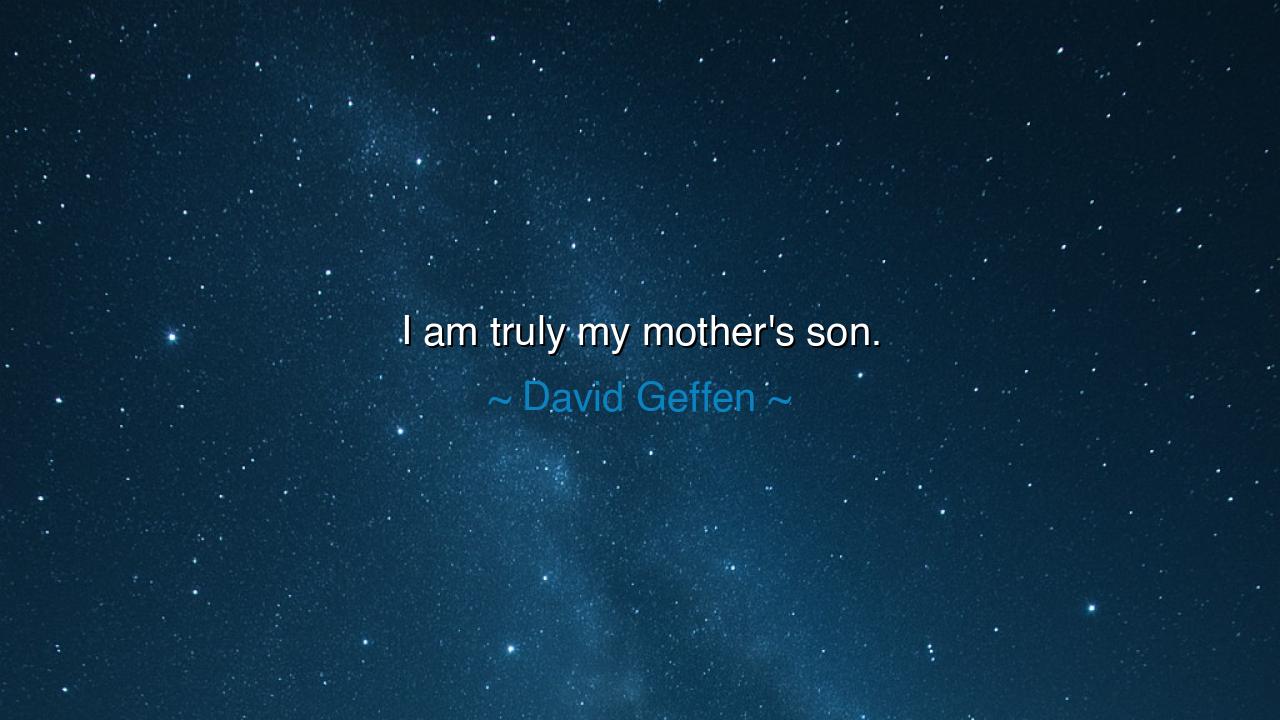
I am truly my mother's son.






The words of David Geffen — “I am truly my mother’s son.” — carry the weight of lineage, identity, and the unspoken power of maternal influence. In these six simple words lies a universe of meaning: that who we are is not solely the product of chance or ambition, but a reflection of the values, character, and spirit imparted by those who first nurtured us. Geffen’s declaration is at once personal and universal, echoing an eternal truth that has resonated through generations — that the hand that raises us, guides us, and shapes us leaves a permanent imprint on the soul.
To say “I am truly my mother’s son” is to acknowledge the profound inheritance of character and virtue. The ancients knew this principle well. In the philosophies of Confucius and Aristotle, the family was the first school of ethics; children learned courage, integrity, and compassion not from abstract texts, but from observing the deeds, words, and manner of their parents. By claiming his identity as his mother’s son, Geffen recognizes that the foundation of his own life — his decisions, his moral compass, and even his ambitions — is inseparable from the woman who guided his earliest steps.
This acknowledgment is also an act of humility and gratitude. To see oneself as the product of another is to honor that influence, to recognize that achievement and identity are not formed in isolation. Consider Alexander the Great, whose mother Olympias instilled in him confidence, courage, and an understanding of divine destiny. Her guidance and example were as formative as any teacher or battlefield, shaping the man who would conquer the known world. Geffen, in echoing this truth, reminds us that mothers leave a legacy far beyond nurture: they leave the blueprint of character itself.
The phrase carries another layer of meaning: it signals the recognition of emotional and moral inheritance. Mothers impart more than knowledge; they imbue resilience, discernment, empathy, and the capacity for love and judgment. Geffen’s statement acknowledges that these qualities are inextricable from his sense of self. To be “truly” his mother’s son is to embody the ethics, sensibilities, and worldview she instilled — the invisible yet enduring scaffolding upon which his life is built.
History is replete with examples where maternal influence defined destinies. Consider Abigail Adams, whose counsel to her husband John Adams shaped not only his decisions as a revolutionary leader but also his sense of justice and equality. Her wisdom and courage became a guiding force in the foundation of a nation. Similarly, Geffen’s reflection captures the quiet truth that the presence, values, and strength of a mother echo in the life of her child, influencing outcomes far beyond the home.
This recognition also carries a call to reflection and self-awareness. To acknowledge oneself as the son of one’s mother is to examine how her virtues, struggles, and teachings have molded personal choices. It invites gratitude and responsibility: to honor her influence by living a life that reflects integrity, wisdom, and courage. Geffen’s simple statement is thus a meditation on legacy — the understanding that who we are today is inseparable from the sacrifices and teachings of those who came before us.
From this reflection, a lesson emerges for all: embrace and honor the influence of your mother, and recognize the ways it shapes your identity and actions. To live consciously as one’s mother’s child is to carry forward the virtues she instilled, to act with moral clarity, and to nurture the same strength in future generations. It is an acknowledgment that our lives are threads woven from the fabric of those who nurtured us, and that our deeds resonate far beyond our own time.
Thus, David Geffen’s words endure as both a testament and a teaching: to be truly one’s mother’s child is to carry her wisdom, courage, and values into the world, allowing her influence to shape not only the self but the lives touched by that self. In this acknowledgment, we find gratitude, humility, and the eternal lesson that the imprint of a mother is both profound and everlasting — a guiding force that shapes destiny, character, and the heart itself.






AAdministratorAdministrator
Welcome, honored guests. Please leave a comment, we will respond soon